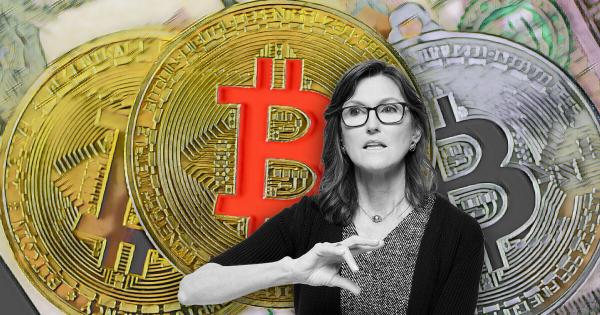
The SkyBridge Alternatives (SALT) Conference, which took place in New York in September, brought together a large number of Wall Street fund managers to discuss Bitcoin (CRYPTO: BTC), fintech, and other alternative investments. Cathie Wood, the CEO of ARK Invest, was among those in attendance, and she shared some valuable insights with the audience during her time onstage.
In particular, moderator Andrew Sorkin inquired as to which cryptocurrency she would choose to own if she had to pick just one. Wood attempted to sidestep the question by stating that her company would allocate 60 percent of its resources to Bitcoin and 40 percent to Ethereum, respectively. In addition to her long-standing support for bitcoin, Wood's success in the stock market should encourage investors to take a closer look at both cryptocurrencies. Bitcoin, in particular, stands out as a noteworthy exception.
Bitcoin is considered to be the king of cryptocurrencies.
The digital currency Bitcoin made its debut 12 years ago, but the ripple effects are still reverberating throughout the financial world. Satoshi Nakamoto, the project's pseudonymous creator, published a white paper in 2009 referring to Bitcoin as a "peer-to-peer electronic cash system," emphasizing the project's ability to power digital transactions without the involvement of third-party intermediaries such as banks, card networks, or payment processing companies.
What is the procedure for doing this? Cryptocurrency Bitcoin is a piece of software built on blockchain technology, which is a decentralized database that currently runs on more than 15,000 computers (nodes) around the world, recording transactions and keeping track of account balances. Miners rely on a consensus mechanism known as proof of work (PoW) to ensure the security of the network, which means they use their computing power to solve cryptographic puzzles and validate blocks of transactional information. Miners receive transaction fees (which are paid by users) and block rewards in exchange for adding new blocks to the blockchain and adding new transactions to the blockchain (newly minted currency). To put it another way, the combination of blockchain technology and cryptography eliminates the need for financial intermediaries.
Aside from that, the source code of Bitcoin specifies that the block reward is reduced by half every 210,000 blocks, effectively limiting the total supply to 21 million coins. Bitcoin, like gold, is valuable due to its scarcity, which makes it a valuable investment. As a matter of fact, Bitcoin is frequently referred to as "digital gold," and it is worth more than any other cryptocurrency, with a market capitalization of $1 trillion. That combination of characteristics — scarcity and popularity — serves as the foundation of the investment thesis.
In support of that notion, interest in digital assets has grown beyond the realm of retail traders, with institutional investors becoming increasingly interested in the space. In reality, institutions hold approximately 1.46 million Bitcoin, accounting for 7.7 percent of the circulating supply and 6.9 percent of the fully diluted supply of the cryptocurrency. Public companies like MicroStrategy, governments like El Salvador, and asset managers such as Grayscale Investments, the creator of the Grayscale Bitcoin Trust, are all examples of those who fall into this category.
Wood predicts that companies will continue to diversify into Bitcoin (and other cryptocurrencies), eventually allocating 5 percent of their total funds to digital assets, and that this trend will continue. In Wood's opinion, this upward trend will drive the price of Bitcoin to $500,000 by 2026, representing an 820 percent increase from the current price of $54,300 per coin. As a result, cryptocurrency appears to be a wise long-term investment at this time.
